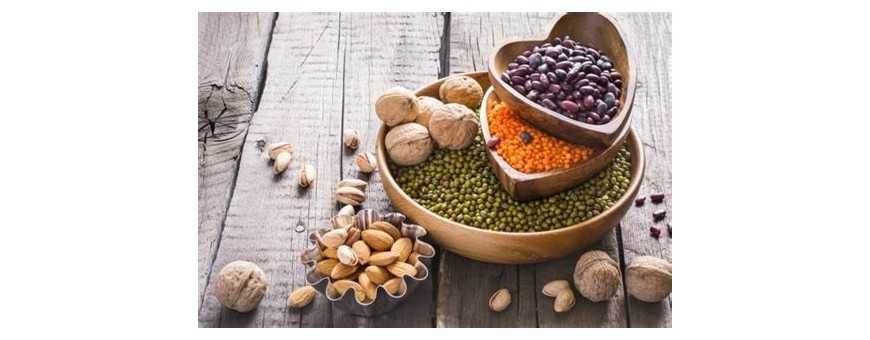Sorry for the inconvenience.
Search again what you are looking for
SOXLANA offers you everything you need. Be satisfied first and then pay later.

Plant protein is an alternative source of protein that has been shown to be just as effective as other types of powders. Plants are actually a great source of protein and are recommended to get the most from your diet.
Why eat vegetable protein
Proteins are very important for the body because they are responsible for, among other things, cell regeneration. They are also involved in helping the body fight infections and diseases. In fact, a protein deficiency causes major problems such as greater general fatigue, loss of muscle mass, and poorer resistance to disease and infection.
Vegetable proteins are healthy and contained in foods with often very interesting nutritional qualities. In addition, for health, the planet and the animal condition, it is strongly recommended to reduce your consumption of animal proteins (dairy products, meat, fish).
Proteins are, along with carbohydrates and lipids, macronutrients that constitute certain foods in more or less quantity.
They have a major role in the structure and construction of our cells and organs, including muscles, skin, hair, nails, etc.
Compared to animal proteins, many vegetable proteins have somewhat lower levels of essential amino acids, especially lysine. And to a lesser extent in methionine and threonine.
But the exclusive consumption of vegetable proteins does not prevent you from having a balanced diet of essential amino acids, as long as you make the right combinations!
Some brands like Nutripure also offer organic vegetable protein blends with an excellent amino acid profile, with optimized digestibility.
Here are the 20 foods richest in vegetable protein. To understand everything about how they work, go after the list.
1. Spirulina: 65 g of protein per 100 g
2. Tofu: 36 g of protein per 100 g
3. Moringa: 27.1g of protein per 100g (powder)
4. Hemp seeds: 26 g of protein per 100 g
5. Lentils: 25 g of protein per 100 g
6. Fenugreek seeds: 23 g of protein per 100 g
7. Tempeh: 20 grams of protein per 100 g
8. Cocoa: 19.6 g of protein per 100 g
9. Seeds (sesame, sunflower, poppy, almonds): 18 g of protein on average per 100 g
10. Chia seeds: 17 g of protein per 100 g
11. Quinoa: 14 g of protein per 100 g
12. Goji berries: 12.1g of protein per 100g
13. Maca: 10.2g of protein per 100g
14. Beans: 9 g of protein per 100 g
15. Cereals (wheat, rice, corn): on average 8g of protein per 100g
16. Chickpeas: 5 g of protein per 100 g
17. Green vegetables: 1 g of protein for 30 g of spinach. 3.3 g per 100 g of kale. 2.8 g per 100 g of broccoli
19. Mushrooms (shiitake): 2.4 g of protein per 100g
20. Herbal infusions: rhodiola, yerba mate ...
Plant proteins and deficiencies
No, quality protein is not only found in meat or fish! You can get enough protein (and all of the essential amino acids) by eating fruits and vegetables. In fact, contrary to popular belief, it is possible to do without animal proteins entirely thanks to vegetable proteins. However, you need to vary your diet and eat a balanced diet (as always, regardless of the diet chosen). For comparison, know that 100 g of meat contains about 20 g of protein, almost 3 times less than spirulina which contains almost 60 g!
Thanks to our table, you will realize how easy it is to find vegetable proteins in our food and you will never be afraid of deficiencies again.
How much protein should you eat per day?
It is advisable to consume at least 0.8 g / kg / day, but it all depends on each person. Be careful, however, of the excess protein! If protein deficiency is bad for the body, so too is excess. The ideal protein share is estimated to be around 15% of total energy intake, which means that for every 1000 kcal supplied to the body, around 150 kcal should be provided by protein. Knowing that one gram of protein provides 4 kcal, therefore, 37.5 g of protein should be supplied to the body for every 1000 kcal.
Of course, these are average estimates and these figures should be adapted according to each organism (example: athletes need more protein).
Plant proteins and bodybuilding: is it possible?
Many athletes supplement themselves with protein in order to improve their muscle mass gain. In this case, just like with animal proteins, it is quite possible to find powdered vegetable proteins. For temporary needs or to promote muscle gain, this type of supplement can be very useful. However, to preserve your body and make the most of the benefits of proteins, prefer to buy organic proteins!
Search again what you are looking for
This website uses cookies. By continuing to browse the site, you accept our use of cookies. En savoir plus ici.
